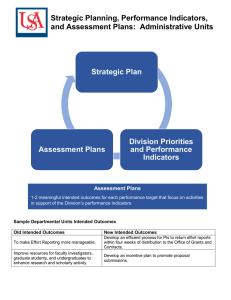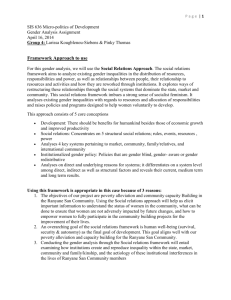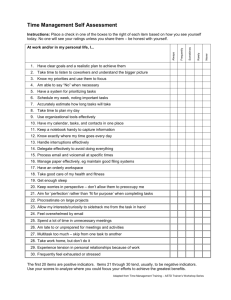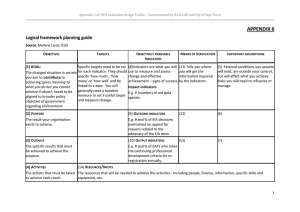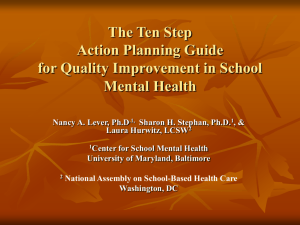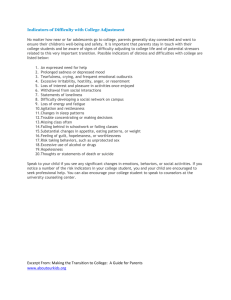Southern California Socioeconomic Assessment: Sociodemographic Conditions, Projections, and Quality of Life Indices
advertisement
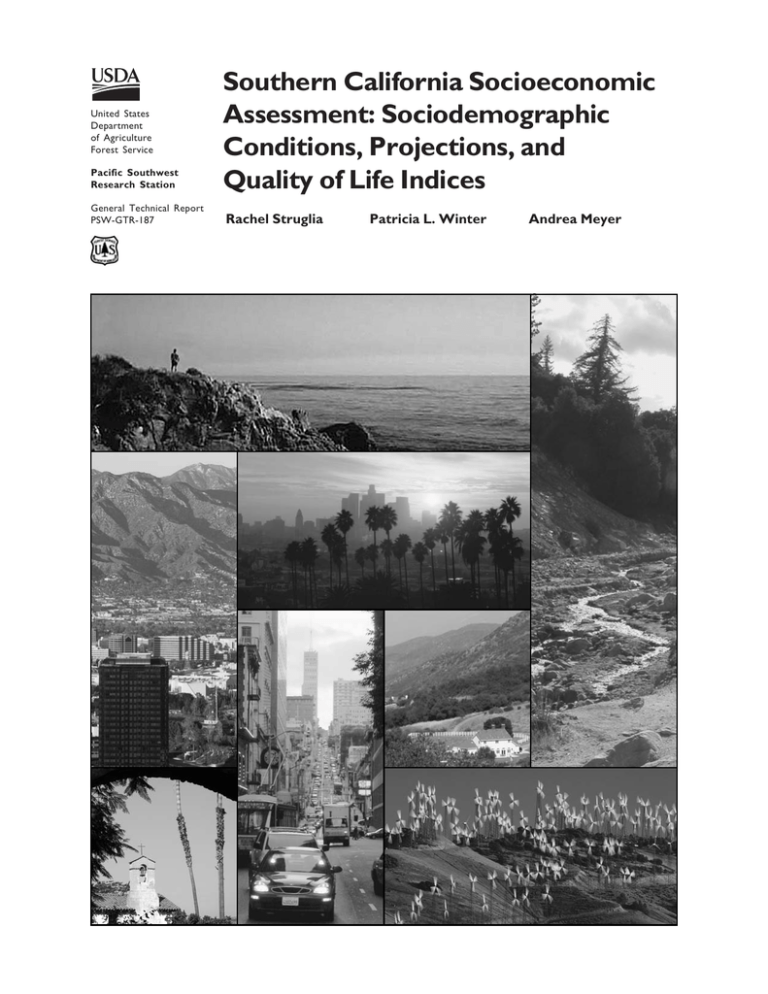
United States Department of Agriculture Forest Service Pacific Southwest Research Station General Technical Report PSW-GTR-187 Southern California Socioeconomic Assessment: Sociodemographic Conditions, Projections, and Quality of Life Indices Rachel Struglia Patricia L. Winter Andrea Meyer Publisher Albany, California Mailing address: PO Box 245, Berkeley CA 94701-0245 (510) 559-6300 www.fs.fed.us/psw Pacific Southwest Research Station Forest Service U.S. Department of Agriculture Abstract Struglia, Rachel; Winter, Patricia L.; Meyer, Andrea. 2003. Southern California socioeconomic assessment: Sociodemographic conditions, projections, and quality of life indices. Gen. Tech. Rep. PSW-GTR-187. Albany, CA: Pacific Southwest Research Station, Forest Service, U.S. Department of Agriculture; 418 p. This report summarizes findings from the regional and county socioeconomic assessment conducted for southern California. The 26-county region extends from San Diego to the San Francisco Bay Area. A majority of the state’s population resides within this region, which surrounds the four southern California National Forests (Angeles, Cleveland, Los Padres, and San Bernardino). Regional and county descriptions, including histories, population sociodemographics and projections, and quality of life indicators are examined. The information is of use to natural resource and area planners concerned with the implications of social change in the region. Retrieval Terms: socioeconomic assessment, demographic changes, population projections, quality of life indicators, urban growth, southern California The Authors Rachel Struglia was, at the time this report was prepared, a research social scientist with the Station’s Wildland Recreation and Urban Cultures Research Unit, 4955 Canyon Crest Drive, Riverside, CA 92507-6099. Patricia L. Winter is a research social scientist with the Station’s Wildland Recreation and Urban Cultures Research Unit, 4955 Canyon Crest Drive, Riverside, CA 92507-6099, e-mail: pwinter@fs.fed.us. Andrea Meyer was, at the time this report was prepared, a social science technician with the Station’s Wildland Recreation and Urban Cultures Research Unit, 4955 Canyon Crest Drive, Riverside, CA 92507-6099. Southern California Socioeconomic Assessment: Sociodemographic Conditions, Projections, and Quality of Life Indices Rachel Struglia Patricia L. Winter Andrea Meyer Contents In Brief .....................................................................................................................viii Pacific Southwest Research Station Acknowledgments ....................................................................................................ix USDA Forest Service General Technical Report PSW-GTR-187 I. Introduction ............................................................................................................. 1 June 2003 Statement of Purpose .......................................................................................... 1 The Assessment Area .......................................................................................... 3 The Structure for Land Management and Planning in the Assessment Area............................................................................................. 4 Information Sources and Challenges ................................................................ 5 Social and Political Context................................................................................ 8 Setting the Context for the Assessment .......................................................... 12 Organization of this Assessment ..................................................................... 13 References........................................................................................................... 13 II. The San Diego Association of Governments (SANDAG) Region ............. 17 San Diego County ............................................................................................ 18 History..........................................................................................................18 San Diego County Today ...........................................................................20 Sociodemographic Characteristics ..................................................20 Development and Real Estate ..........................................................23 Quality of Life Indicators..................................................................23 Environmental Indicators .................................................................27 Summary and Implications for the SANDAG Region ..............................28 References ....................................................................................................29 III. The Southern California Association of Governments (SCAG) Region .31 Imperial County............................................................................................... 36 History......................................................................................................... 36 Imperial County Today ............................................................................. 38 Sociodemographic Characteristics ................................................. 38 Development and Real Estate ......................................................... 42 Quality of Life Indicators................................................................. 43 Environmental Indicators ................................................................ 45 i Contents Implications .............................................................................................46 References ................................................................................................47 Los Angeles County .................................................................................... 48 History......................................................................................................48 Los Angeles County Today....................................................................51 Sociodemographic Characteristics ..............................................51 Development and Real Estate ......................................................53 Quality of Life Indicators..............................................................55 Environmental Indicators .............................................................58 Implications .............................................................................................58 References ................................................................................................59 Orange County..............................................................................................61 History......................................................................................................61 Orange County Today ............................................................................63 Sociodemographic Characteristics ..............................................63 Development and Real Estate ......................................................66 Quality of Life Indicators..............................................................67 Environmental Indicators .............................................................69 Implications .............................................................................................70 References ................................................................................................71 Riverside County..........................................................................................73 History......................................................................................................73 Riverside County Today ........................................................................75 Sociodemographic Characteristics ..............................................77 Development and Real Estate ......................................................79 Quality of Life Indicators..............................................................80 Environmental Indicators .............................................................82 Implications .............................................................................................83 References ................................................................................................84 San Bernardino County ...............................................................................86 History......................................................................................................86 San Bernardino County Today ..............................................................88 Sociodemographic Characteristics ..............................................89 Development and Real Estate ......................................................90 Quality of Life Indicators..............................................................92 Environmental Indicators .............................................................95 Implications .............................................................................................95 References ................................................................................................96 Ventura County.............................................................................................98 History......................................................................................................98 Ventura County Today .........................................................................100 Sociodemographic Characteristics ............................................100 Development and Real Estate ....................................................104 Quality of Life Indicators............................................................105 Environmental Indicators ...........................................................107 ii USDA Forest Service Gen. Tech. Rep. PSW-GTR-187. 2003. Contents Implications ...........................................................................................108 References ..............................................................................................109 Summary and Implications for SCAG Region .....................................110 IV. The Central Coast Region........................................................................... 111 Monterey County........................................................................................114 History.................................................................................................... 114 Monterey County Today ...................................................................... 116 Sociodemographic Characteristics ............................................ 116 Development and Real Estate .................................................... 119 Quality of Life Indicators............................................................120 Environmental Indicators ...........................................................122 Implications ...........................................................................................123 References ..............................................................................................124 San Luis Obispo County ...........................................................................126 History....................................................................................................126 San Luis Obispo County Today ..........................................................127 Sociodemographic Characteristics ............................................128 Development and Real Estate ....................................................131 Quality of Life Indicators............................................................131 Environmental Indicators ...........................................................133 Implications ...........................................................................................134 References ..............................................................................................135 Santa Barbara County ................................................................................136 History....................................................................................................136 Santa Barbara County Today...............................................................138 Sociodemographic Characteristics ............................................138 Development and Real Estate ....................................................140 Quality of Life Indicators............................................................141 Environmental Indicators ...........................................................144 Implications ...........................................................................................145 References ..............................................................................................146 Santa Cruz County .....................................................................................147 History....................................................................................................147 Santa Cruz County Today....................................................................149 Sociodemographic Characteristics ............................................149 Development and Real Estate ....................................................152 Quality of Life Indicators............................................................152 Environmental Indicators ...........................................................155 Implications ...........................................................................................156 References ..............................................................................................156 Summary and Implications for the Central Coast Region..................158 V. The Central Valley Region ...........................................................................159 Fresno County .............................................................................................163 History....................................................................................................163 USDA Forest Service Gen. Tech. Rep. PSW-GTR-187. 2003. iii Contents Fresno County Today ...........................................................................164 Sociodemographic Characteristics ............................................165 Development and Real Estate ....................................................167 Quality of Life Indicators............................................................168 Environmental Indicators ...........................................................171 Implications ...........................................................................................172 References ..............................................................................................172 Kern County ................................................................................................174 History....................................................................................................174 Kern County Today ..............................................................................176 Sociodemographic Characteristics ............................................176 Development and Real Estate ....................................................178 Quality of Life Indicators............................................................179 Environmental Indicators ...........................................................182 Implications ...........................................................................................183 References ..............................................................................................183 Kings County ..............................................................................................184 History....................................................................................................184 Kings County Today.............................................................................186 Sociodemographic Characteristics ............................................186 Development and Real Estate ....................................................189 Quality of Life Indicators............................................................190 Environmental Indicators ...........................................................192 Implications ...........................................................................................192 References ..............................................................................................193 Merced County............................................................................................194 History....................................................................................................194 Merced County Today..........................................................................196 Sociodemographic Characteristics ............................................196 Development and Real Estate ....................................................199 Quality of Life Indicators............................................................200 Environmental Indicators ...........................................................202 Implications ...........................................................................................203 References ..............................................................................................203 Sacramento County ....................................................................................205 History....................................................................................................205 Sacramento County Today...................................................................206 Sociodemographic Characteristics ............................................207 Development and Real Estate ....................................................209 Quality of Life Indicators............................................................210 Environmental Indicators ...........................................................212 Implications ...........................................................................................213 References ..............................................................................................214 San Benito County .....................................................................................215 History....................................................................................................215 San Benito County Today ....................................................................217 iv USDA Forest Service Gen. Tech. Rep. PSW-GTR-187. 2003. Contents Sociodemographic Characteristics ............................................218 Development and Real Estate ....................................................220 Quality of Life Indicators............................................................221 Environmental Indicators ...........................................................223 Implications ...........................................................................................224 References ..............................................................................................224 San Joaquin County ...................................................................................226 History....................................................................................................226 San Joaquin County Today ..................................................................228 Sociodemographic Characteristics ............................................228 Development and Real Estate ....................................................230 Quality of Life Indicators............................................................231 Environmental Indicators ...........................................................233 Implications ...........................................................................................234 References ..............................................................................................235 Stanislaus County ......................................................................................236 History....................................................................................................236 Stanislaus County Today .....................................................................238 Sociodemographic Characteristics ............................................238 Development and Real Estate ....................................................240 Quality of Life Indicators............................................................241 Environmental Indicators ...........................................................242 Implications ...........................................................................................243 References ..............................................................................................244 Summary and Implications for the Central Valley Region ................245 VI. The Association of Bay Area Governments (ABAG) Region ..............249 Alameda County .........................................................................................252 History....................................................................................................252 Alameda County Today .......................................................................254 Sociodemographic Characteristics.............................................254 Development and Real Estate.....................................................257 Quality of Life Indicators............................................................258 Environmental Indicators ...........................................................260 Implications ...........................................................................................261 References ..............................................................................................261 Contra Costa County..................................................................................262 History....................................................................................................262 Contra Costa County Today ................................................................264 Sociodemographic Characteristics ............................................264 Development and Real Estate ....................................................266 Quality of Life Indicators............................................................267 Environmental Indicators ...........................................................269 Implications ...........................................................................................270 References ..............................................................................................271 USDA Forest Service Gen. Tech. Rep. PSW-GTR-187. 2003. v Contents Marin County ..............................................................................................272 History....................................................................................................272 Marin County Today ............................................................................274 Sociodemographic Characteristics ............................................274 Development and Real Estate ....................................................276 Quality of Life Indicators............................................................277 Environmental Indicators ...........................................................280 Implications ...........................................................................................280 References ..............................................................................................281 San Francisco County ................................................................................282 History....................................................................................................282 San Francisco County Today ...............................................................284 Sociodemographic Characteristics ............................................285 Development and Real Estate ....................................................287 Quality of Life Indicators............................................................288 Environmental Indicators ...........................................................291 Implications ...........................................................................................291 References ..............................................................................................292 San Mateo County ......................................................................................294 History....................................................................................................294 San Mateo County Today.....................................................................296 Sociodemographic Characteristics ............................................296 Development and Real Estate ....................................................299 Quality of Life Indicators............................................................300 Environmental Indicators ...........................................................301 Implications ...........................................................................................302 References ..............................................................................................303 Santa Clara County ....................................................................................304 History....................................................................................................304 Santa Clara County Today ...................................................................306 Sociodemographic Characteristics ............................................307 Development and Real Estate ....................................................310 Quality of Life Indicators............................................................310 Environmental Indicators ...........................................................313 Implications ...........................................................................................313 References ..............................................................................................314 Solano County.............................................................................................316 History....................................................................................................316 Solano County Today ...........................................................................317 Sociodemographic Characteristics ............................................318 Development and Real Estate ....................................................320 Quality of Life Indicators............................................................321 Environmental Indicators ...........................................................323 Implications ...........................................................................................323 References .............................................................................................. 324 vi USDA Forest Service Gen. Tech. Rep. PSW-GTR-187. 2003. Contents Summary and Implications for the ABAG Region ............................... 325 VII. Assessment Area Summary ....................................................................... 327 Selected Trends in the Southern California Socioeconomic Assessment Area ................................................................................... 327 Regional Trends............................................................................................ 329 Summary and Implications for Assessment Area .................................. 331 VIII. Conclusions ................................................................................................ 333 Appendix A: Counties in Socioeconomic Assessment Area, by Five Regional Divisions ....................................................................................................................337 Appendix B: List of Councils of Government................................................ 338 Appendix C: State of California Department of Finance............................. 339 Appendix D: Air Quality Emissions Definitions .......................................... 340 Appendix E: Southern California Association of Governments ................ 341 Appendix F: Association of Bay Area Governments .................................... 343 Appendix G: Summary Tables .......................................................................... 344 USDA Forest Service Gen. Tech. Rep. PSW-GTR-187. 2003 vii In Brief In Brief… Struglia, Rachel; Winter, Patricia L.; Meyer, Andrea. 2003. Southern California socioeconomic assessment: Sociodemographic conditions, projections, and quality of life indices. Gen. Tech. Rep. PSW-GTR-187. Albany, CA: Pacific Southwest Research Station, Forest Service, U. S. Department of Agriculture; 418 p. Retrieval Terms: socioeconomic assessment, demographic changes, population projections, quality of life indicators, urban growth, southern California This report provides a snapshot of the socioeconomic conditions and projected future condition for the region surrounded by the four southern California National Forests (Angeles, Cleveland, Los Padres, and San Bernardino). It is part of the socioeconomic assessment for these forests, designed to address an information gap in the region’s biological and ecological assessment completed in December of 1999. The scheduled update of forest plans for these forests increased the need to address social and economic issues in the region. A variety of regional and county-level indicators are provided. They are designed to capture the complex demographic and environmental changes occurring in the region. While this report is not a decision-making document, it is of relevance to natural resource managers, regional planners, and academicians. Natural resources planning benefits from this assessment because it provides information on how the population is likely to grow and change over time. Impacts on wildland areas can be better anticipated with this information. Population growth is forecasted for all counties in the assessment through 2040, with the largest population increase expected in the Central Valley region. This dramatic increase is of concern in part due to the conversion of agricultural land and open space to suburban development. Increased racial and ethnic diversity, in this already socially diverse region, is also anticipated. In fact, the majority of increase is accounted for among people of color, particularly Hispanics. A changing age structure is also expected in the region, with variation between racial and ethnic groups, as well as variations by gender. A trend of increasing age is anticipated among American Indian, White, and Black populations. However, the median age structure for Hispanics and Asian/Pacific Islanders is much younger. An examination of residential and non-residential development reveals the effects of the 1990s recession, and the build-out characteristic of some regions resulting in high percent occupancy of existing residences. Differences in cost of living are revealed in average rents and the value of owner-occupied housing. Transportation is an issue for many of the counties, where a high percentage of workers are employed outside of the county. This is especially apparent in the Association of Bay Area Governments (ABAG) Region. A comparison of schools based on the Stanford 9, a statewide indicator of academic achievement, reveals the highest performance in San Diego County, and the lowest among Central Valley counties. Water and air quality (measured through emissions) are also reviewed in this report, revealing the best water quality ratings in the San Diego region, and the counties within the Southern California Association of Governments (SCAG) region. The trends identified in this report highlight the need for land management agencies to involve emerging constituencies. It also emphasizes the need for regional, county, city, and land management agencies to strengthen connections and collaborative efforts. These steps will better equip agencies to address the expected population growth and change occurring within the constraint of finite resources. viii USDA Forest Service Gen. Tech. Rep. PSW-GTR-187. 2003. Acknowledgments Acknowledgments We thank the individuals listed below for their reviews of sections of the assessment indicated. Section I: Introduction Scott Bollens, Department of Urban and Regional Planning, University of California, Irvine Section II: SANDAG Charles Rynerson, San Diego Association of Governments Joan Vokac, San Diego County Department of Planning and Land Use Section III: SCAG General region and multiple counties: Simon Choi, Southern California Association of Governments Orange County: William Gayk, Center for Demographic Research, California State University, Fullerton Ron Tippets, Orange County Planning Department Ventura County: Steve Wood, Ventura County Resource Management Agency Riverside County: Pascual Guardado, Riverside County Economic Development Agency Mike Harrod, Riverside County Planning Department Aurora Kerr, Coachella Valley Association of Governments Kevin Viera, Western Riverside Council of Governments Imperial County: Rosa Lopez, Imperial Valley Association of Governments San Bernardino County: Ty Schuiling, San Bernardino Associated Governments Los Angeles County: Jacki Bacharach, South Bay Cities Council of Governments John Boiney, San Gabriel Valley Council of Governments Terry Dipple, Las Virgenes/Malibu Council of Governments Russell Fricano, Los Angeles County Planning Department David Myers, Los Angeles County Economic Development Corporation Nina Potter, Arroyo Verdugo Council of Governments Richard Powers, Gateway Cities Council of Governments Mark Wessel, City of Westlake Village Section IV: Central Coast General region and multiple counties: Bryndie Beach, Association of Monterey Bay Area Governments Santa Cruz County: Mark Deming, Santa Cruz County Planning Department Santa Barbara County: Brian Bresolin, Santa Barbara County Association of Governments USDA Forest Service Gen. Tech. Rep. PSW-GTR-187. 2003. ix Acknowledgments Steven DeCamp, Santa Barbara County Planning and Development Emmanuelle Ledbetter, Santa Barbara County Planning and Development David Ward, Santa Barbara County Planning and Development Monterey County: Jared Ikeda, Monterey County Environmental Resource Policy Tim Jensen, Monterey Peninsula Regional Park District San Luis Obispo County: Steve Devencenzi, San Luis Obispo Council of Governments John Hand, San Luis Obispo County Department of Planning and Building Section V: Central Valley General region and multiple counties: Larry Lloyd, Great Valley Center Fresno County: Kathy Chung, Fresno County Council of Governments John Popp, Fresno County Planning and Resource Management Department Kern County: Dave Rickels, Kern County Planning Department Pete Smith, Kern Council of Governments Merced County: Butch Cope, Merced County Planning Department Patti Dossetti, Merced County Association of Governments Kings County: Bill Zumwalt, Kings County Planning Agency Sacramento County: Ken Hough, Sacramento Area Council of Governments Tom Hutchings, Sacramento County Planning and Community Development San Benito County: Lisa Berg, San Benito Council of Governments Fred Goodrich, San Benito County Planning and Building Department San Joaquin County: Bill Factor, San Joaquin County Community Development Department Kim Kloeb, San Joaquin Council of Governments Stanislaus County: James Dunal, Stanislaus County Planning and Community Development Department Section VI: ABAG General region and multiple counties: Paul Fassinger, Association of Bay Area Governments Alameda County: Sandra Rivera, Alameda County Planning Department x USDA Forest Service Gen. Tech. Rep. PSW-GTR-187. 2003. Acknowledgments Contra Costa County: Patrick Roche, Contra Costa County Community Development Department Marin County: Dan Dawson, Marin County Community Development Agency San Francisco County: Miriam Chion, San Francisco Planning Department Neil Hrushowy, San Francisco Planning Department Santa Clara County: Dunia Noel, Santa Clara County Planning Department Don Weden, Santa Clara County Planning Department San Mateo County: Aaron Sage, San Mateo County Planning and Building Division Section VIII: Conclusions Scott Bollens, Department of Urban and Regional Planning, University of California, Irvine We also thank the following individuals from the Pacific Southwest Research Station: Enoch Bell, Assistant Station Director, for his review of multiple sections of the report; Deborah Chavez, Research Social Scientist, for her review of the report; Laurie J. Dunn and Sandy Young, Technical Editors; and Nancy Knap and Deanne McCollum, Social Science Technicians, for review and comment on interim drafts. USDA Forest Service Gen. Tech. Rep. PSW-GTR-187. 2003. xi The Forest Service, U.S. Department of Agriculture, is responsible for Federal leadership in forestry. It carries out this role through four main activities: • Protection and management of resources on 191 million acres of National Forest System lands; • Cooperation with State and local governments, forest industries, and private landowners to help protect and manage non-Federal forest and associated range and watershed lands; • Participation with other agencies in human resource and community assistance programs to improve living conditions in rural areas; and • Research on all aspects of forestry, rangeland management, and forest resources utilization. The Pacific Southwest Research Station • Represents the research branch of the Forest Service in California, Hawaii, American Samoa, and the western Pacific. The United States Department of Agriculture (USDA) prohibits discrimination in all its programs and activities on the basis of race, color, national origin, gender, religion, age, disability, political beliefs, sexual orientation, and marital or familial status. (Not all prohibited bases apply to all programs.) Persons with disabilities who require alternative means for communication of program information (Braille, large print, audiotape, etc.) should contact USDA’s TARGET Center at: 202-720-2600 (voice and TDD) To file a complaint of discrimination, write: USDA Director Office of Civil Rights Room 326-W Whitten Building 14th & Independence Avenue, SW Washington, DC 20250-9410 or call: Federal Recycling Program Printed on Recycled Paper (202) 720-5964 (voice or TDD) USDA is an equal opportunity provider United States Department of Agriculture Forest Service Pacific Southwest Research Station General Technical Report PSW-GTR-187 Southern California Socioeconomic Assessment: Sociodemographic Conditions, Projections, and Quality of Life Indices
